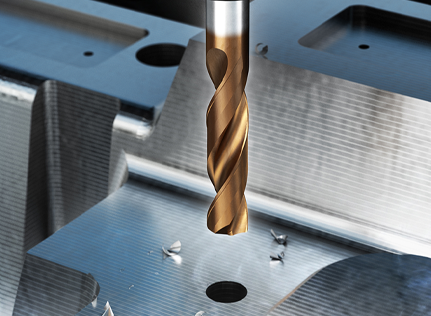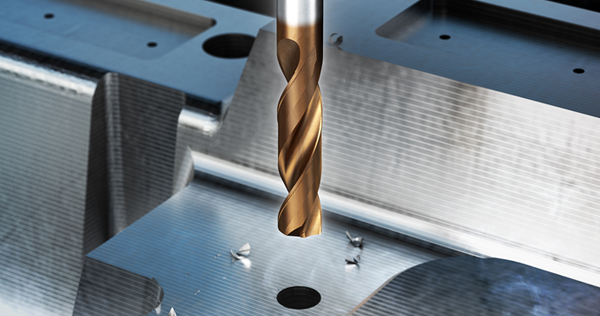Don't have an account?
Creating an account has many benefits: check out faster, keep more than one address, track orders and more.
Or
Checkout as a Guest
Place your order without creating an account for extra convenience.


Carbide Vs HSS Drills


Nathan Smith
Technical Support
10 years engineering experience, specializing in CNC 3 & 4 axis milling, measurement and inspection.
Drilling is a crucial process in any industrial project. It’s essential to have the right tools for the job because using the wrong tool can lead to poor results, loss of time, and money.
Solid drilling involves creating holes in a workpiece by using a drill bit. Substrate might not sound like an essential factor, but it can significantly affect the drilling process in various ways including cost, machine capabilities, set up and materials.
What are HSS Drills?
HSS or high-speed steel drills are one of the oldest types of drills used in metalworking. These drills are made of carbon steel, tungsten, and other materials, making them economical for many applications. HSS drills can be used on many materials, including steel, stainless steel, cast iron and much more.
Why would you use a HSS Drill?
HSS drills are generally used on manual machines. They are ideal for general purpose applications and if you are looking to lower your tooling costs. HSS has good heat resistance making it suitable for drilling various materials. It’s a great alternative when carbide is too expensive or not suitable for the job at hand.
What are the advantages of using a HSS Drill?
1. Versatility: HSS drills can tackle a wide range of materials, including wood, plastic, aluminium, mild steel, cast iron and stainless steel. This versatility makes them a trusted choice for many drilling applications across a range of industries.
2. Cost-Effective: HSS drills are considerably more affordable than carbide drills, making them a cost-effective solution for general-purpose drilling operations. Their impressive tool life and ability to be resharpened further add to their economic value.
3. Heat Resistance: HSS drills possess excellent heat resistance, allowing them to maintain their cutting performance even at high speeds. Their ability to dissipate heat efficiently helps prevent tool overheating and extends tool life.
4. Flexibility & Toughness: Compared to carbide drills, HSS drills are tougher and more forgiving which makes them structurally stronger. HSS drills also have some flexibility, making them less prone to breaking or chipping, especially when encountering unexpected obstacles while drilling.
What are the disadvantages of using a HSS Drill?
1. Speed Limitations: One major drawback of HSS drills is their inability to achieve the same cutting speed as carbide drills when drilling through tougher materials like hardened steel or exotics. Slower drilling can result in reduced efficiency and decreased tool life in certain applications.
2. Durability: While HSS drills are highly durable for their price range, they are not as durable as carbide drills. They tend to wear down faster, especially when drilling through abrasive materials or engaging in heavy-duty tasks. Frequent replacements or resharpening may be necessary for prolonged use.
3. Less Suitable for Precision Work: HSS drills are less suitable for precision drilling work due to their relatively larger drill point compared to carbide drills. When drilling small or intricate holes, precision and accuracy are essential, making carbide drills a preferred choice.


What are Carbide Drills?
Carbide drills are a type of drill bit that is made from tungsten carbide, a very hard and durable material. Carbide drills are typically used for drilling through hard materials such as steel, stainless steel, cast iron, and more.
What are the advantages of using a Carbide Drill?
1. Hardness: Carbide drills are renowned for their exceptional hardness compared to that of HSS drills. Made from a combination of tungsten carbide and cobalt, they can effortlessly drill through tough materials like stainless steel, hardened steel, cast iron, and even abrasive materials like fiberglass. This enhanced hardness leads to higher productivity and durability.
2. Superior Heat Resistance: Unlike HSS drills that can lose their cutting edge when exposed to intense heat, carbide drills can maintain their performance even under extreme temperatures. This makes them ideal for high-speed drilling operations or prolonged drilling tasks that generate significant heat.
3. Precision and Accuracy: Carbide drills give exceptional performance when it comes to precision drilling. Their strong and sharp cutting edges result in cleaner and more accurate holes, reducing the chances of inaccuracies or irregular shapes.
4. Versatility: Carbide drills have remarkable versatility by effortlessly drilling through a wide range of both hard and soft material types. This can include stainless steel, hardened steel, exotics, aluminium and much more. Carbide drills are designed to handle diverse drilling applications and this versatility saves the hassle of switching between different drill bits, increasing overall efficiency.
What are the disadvantages of using a Carbide Drill?
1. High Cost: One of the primary drawbacks of carbide drills compared to HSS drills is their higher cost. The production process and the combination of rare materials contribute to their higher price tag. However, considering their durability and superior performance, carbide drills prove to be a worthy long-term investment.
2. Brittle Nature: Although carbide drills are incredibly hard, they can be susceptible to brittleness under certain circumstances. Excessive pressure, improper usage, or accidental drops can potentially lead to chipping or breaking. Handling carbide drills with care and employing proper drilling techniques can prevent such issues.


What other drill substrates are available?
Powder metal is another substrate that is used for drills. Powder metal is effective because it has the ability of running at a similar performance to carbide and is tough like HSS. When machining conditions are unstable, powder metal drills are ideal to use on CNC and manual machines, providing excellent performance on steels, stainless steels, HRSA, and cast iron.
Powder metal drills are durable, hard and very cost-effective. They can drill through different materials with a small risk of chipping.
Summary
In conclusion, HSS and carbide drills each have their own unique benefits. If you're looking for an affordable, versatile drill that can handle a range of projects, a HSS drill is the way to go.
However, if you're working with tough materials or require a drill that will maintain its sharpness for longer periods of time, a carbide drill may be the better option. If you’re wanting longer tool life than HSS, but don’t want to spend too much for a carbide drill, our HSS-PM powder metal drills are also an excellent option.
For expert advice on choosing the correct drill substrate for your application, please contact our technical team on 01924 869 615 or email sales@cutwel.net
Shop Cutwel's Range of Drills...
Solid Carbide Drills


Solid carbide drills for general, high performance and extreme performance drilling. Ranges for short and deep hole drilling.
Performance HSS Drills


HSS drills for increased performance on a wide range of materials include stainless steel, cast iron, aluminium and more,

